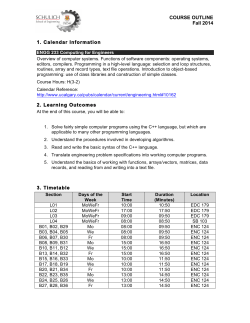
How to get involved with research in the FACULTY of...
How to get involved with research in the FACULTY of MEDICINE WHY DO RESEARCH? - Learn new skills Apply the skills learned in the classroom in a real world setting Gain an insight into the world of academia Have experiences that can help you decide if a Masters or PhD is the right choice for you Find out what kind of environments you prefer (e.g. clinical, laboratory, field-based, etc.) Form valuable relationships with faculty members STEP 1: Create or Find an Opportunity with a Professor or an Institution (November – January) The first step is to find a professor whose research you are interested in. There are many ways to do this: - Browse the faculty website and read about professors’ research interests. Affiliated institutions also have listings of researchers who are working in particular areas. o Alberta Children’s Hospital: http://research4kids.ucalgary.ca/members o Calvin, Phoebe and Joan Snyder Institute of Infection, Immunity and Inflammation: http://snyder.ucalgary.ca/our-team o Libin Cardiovascular Institute: http://libin.ucalgary.ca/people o Hotchkiss Brain Institute: http://www.hbi.ucalgary.ca/members o Institute for Public Health: http://iph.ucalgary.ca/research_groups o McCaig Institute: Bone & Joint Health: http://mccaiginstitute.com/research/members/ o South Alberta Cancer Research Institute http://www.sacri.ucalgary.ca/currentopportunities - Take an independent research course, such as MDSC 507, with a professor whose research you are interested in. - Ask a professor whose class you enjoy about their research - Attend events such as the SU Undergraduate Research Symposium and see the kinds of research happening on campus. If you see a project you really like, ask the presenter about it and get in touch with their supervisor. STEP 2: Contact the Professor or Institution (November – January) Once you’ve found a professor whose research appeals to you: - Read a few of their papers to gain a deeper understanding of their research - Email the professor expressing interest in their research: o Include your transcript and resume o Include reasons for why you want to work on their research specifically o Include any relevant experience not listed in your resume (e.g. from lab courses, etc.) - Researchers are very busy people. Some will be looking for summer students, others won’t. Don’t be discouraged if someone turns you away or doesn’t respond. The more people you contact, the better chances you have at finding a position and entering the exciting field of medical research! STEP 3: Meet with the Professor (November – January) This is a great opportunity for you to find out about how the professor’s research team or lab operates and what your role will be. STEP 4: Determining your Project Depending on the professor or institution and their research, they might assign you a project or you may be able to propose a project yourself. This will vary between professors and institutes so don’t be shy to ask. STEP 5: Apply for Funding (December – February) Deadlines for most grants are in January or February, so it’s best to start on applications in December in order to give yourself, your supervisor, and your references enough time. Some potential sources of funding include the following: - Alberta Cancer Foundation Summer Studentship: http://albertacancer.ca/document.doc?id=315 Alberta Innovates Health Solutions Summer Studentship: http://www.aihealthsolutions.ca/grants/Sum-student.php Canadian Association of Gastroenterology (CAG): http://cag-acg.org/summer-studentships Markin Undergraduate Student Research Program (USRP) in Health and Wellness: http://www.ucalgary.ca/usrp/ NSERC Undergraduate Student Research Awards (USRA): http://www.nserccrsng.gc.ca/students-etudiants/ug-pc/usra-brpc_eng.asp O’Brien Centre Summer Studentship (OCSS) – BHSc Students only: http://ucalgary.ca/bhsc/node/82 Program for Undergraduate Research Experience (PURE): http://www.ucalgary.ca/provost/TLFC/awards/undergrad STEP 6: Work on your project and enjoy the Summer or Semester! This is your time to apply the knowledge you’ve learned in the classroom but also to open your mind to new ways of thinking and doing things. Remember that although you are doing research in order to contribute to a body of knowledge, a major part of doing undergraduate research is also increasing your own abilities, skills, and expertise. If you aren’t getting what you want out of the opportunity, speak up! Most supervisors want you to have the best experience possible and grow as a researcher, so if you ask for support in that process, they will do their best to help you. STEP 7: Present your Findings There are countless opportunities to present your research from the summer. Events such as the SU’s Undergraduate Research Symposium allow you to showcase your work while being eligible for thousands of dollars in prizes, whereas journals (including some which specifically publish undergraduate work) provide a venue to more broadly disseminate your findings.
© Copyright 2025





















